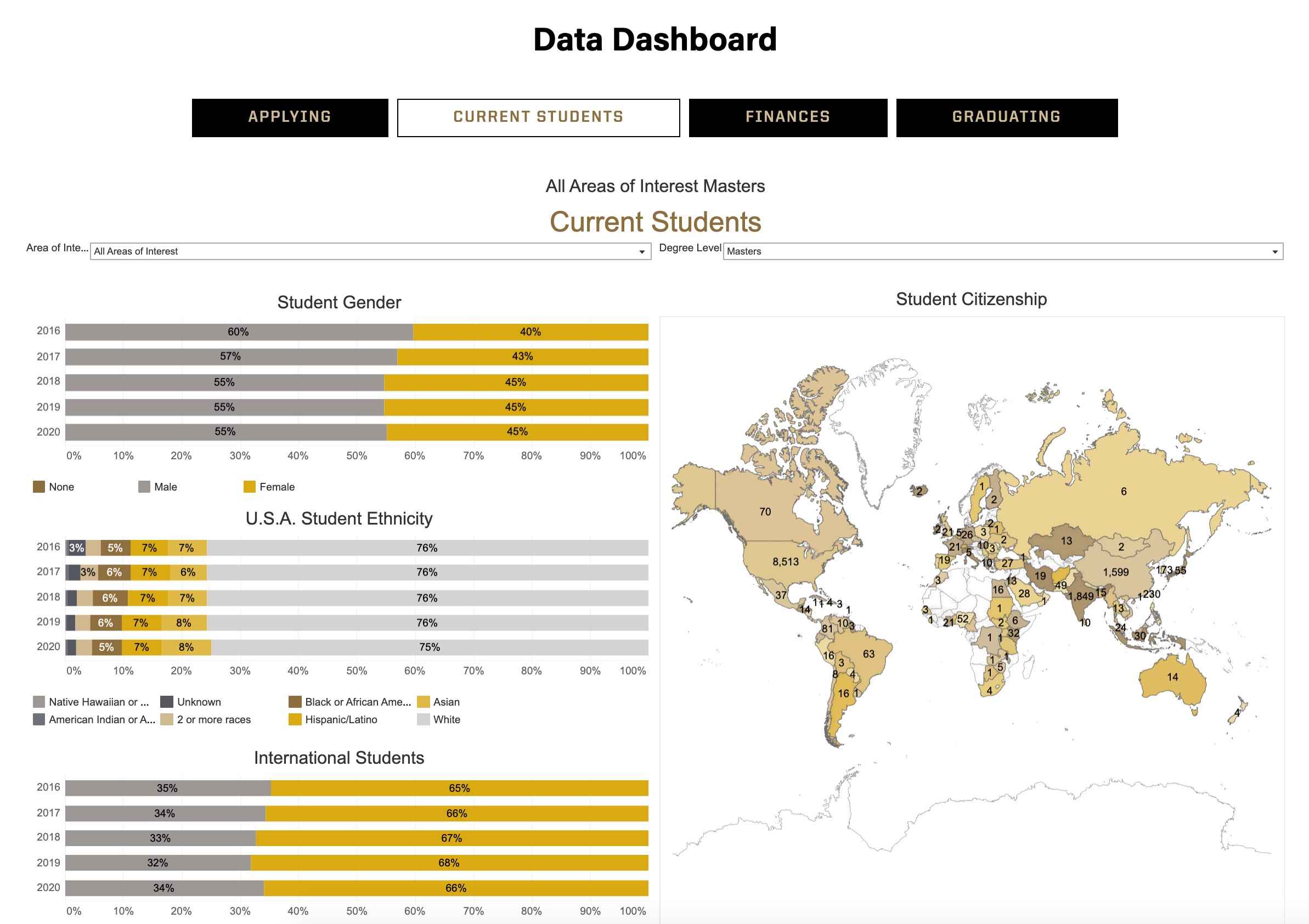New online, interactive tool publishes graduate program data, career outcome

Purdue University Graduate School’s new interactive Data Dashboard provides detailed information about Purdue West Lafayette graduate programs, such as application outcomes, funding sources, times to degree, student demographics, and job outcomes.
Prospective graduate students who are researching graduate programs at Purdue University now have access to a new interactive website and user-friendly data dashboard that provide detailed graduate program data and career outcomes.
The new tools align with a national call from the Association of American Universities (AAU) for member universities to make public data pertaining to programs and career outcomes for masters and doctoral students.
“Our dynamic data dashboard enables prospective students to explore our graduate programs, make more informed choices, and better prepare for likely career paths,” said Linda J. Mason, Dean of The Graduate School. “As more institutions make their graduate program data and career outcomes transparent, it not only helps prospective students compare programs across institutions, but it enables everyone to see how graduate students fare as they navigate graduate education and join the workforce.”
In a 2017 statement, the AAU called on PhD granting universities to commit to providing prospective and current students with easily accessible information, such as student demographics, time to degree, financial support, and career outcomes, and to developing infrastructure and policies to capture and make public such data.
Both tools are online and available to the general public. Purdue’s Graduate Degree Programs webpage displays summarized statistics, descriptions, and links to information about masters and doctoral programs on the West Lafayette campus.
The interactive Graduate School Data Dashboard, which can be accessed directly or via a link on the Graduate Degree Programs webpage, provides more detailed and specific information, including:
· application outcomes;
· funding sources, including primary funding appointments for doctoral students;
· average times to degree and completion rates;
· student-to-faculty ratio;
· demographics of applicants and current students by minority, gender, and citizenship; and
· top five job outcomes, industries, and employers.
The Graduate School’s new Graduate Degree Programs webpage displays summarized statistics, descriptions, and links to information about masters and doctoral programs on the West Lafayette campus.
“The Graduate Degree Programs page is designed to give prospective students answers to their top three questions first,” said James Mohler, associate dean of The Graduate School. “After students determine that the university has a program that aligns with their research interests, they look to see the likelihood of getting accepted, getting funding, and completing on time. If they want to take a deeper dive into the program, they can access the data dashboard.”
However, the data shown in these tools are only a part of a program’s story.
“The biggest thing the data dashboard doesn’t capture is the climate of a program,” Mohler said. Students should also still plan to visit the program and talk to other graduate students to get the “real scoop” on environmental factors that may not be quantifiable.
The program-level job outcome data shown in the data dashboard are self-reported via surveys conducted by Purdue’s Center for Career Opportunities of alumni approximately six months after graduating.
“Faculty members and current students can use the dashboard to see what careers recent graduates are pursuing, where they are working, even the most popular employers,” Mason said. “We hope that making these data more easily accessible will help inform conversations between advisors and their students about available training and career development opportunities as students prepare to enter the job market.”
The Graduate School is participating in other data sharing projects, including the Council of Graduate Schools’ (CGS) study of PhD career pathways. In fall 2020, The Graduate School received a grant from CGS to study the career pathways of humanities PhDs and will provide more information on those specific degrees at the conclusion of the study.
Writer: Korina Wilbert
Sources: Linda J. Mason, lmason@purdue.edu
James L. Mohler, jlmohler@purdue.edu